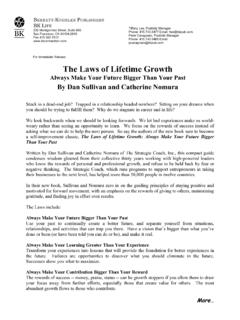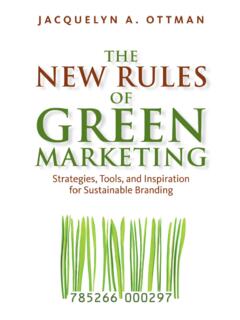Transcription of Organization Development Principles, Processes, Performance
1 An excerpt from Organization Development Principles, Processes, Performance by Gary N. McLean Published by Berrett-Koehler Publishers 1 What Is Organization Development ?CHAPTER OUTLINED efinitions of an OrganizationDefining ODWho Is an OD Professional?Models for Doing ODRoots and History of ODWhen and Why Should an Organization Use OD?A Values-Based FieldChapter SummaryQuestions for Discussion or 10/10/05 5:03 PM Page 1 OVERVIEWThis chapter presents the definitional issues, the businesscase for OD, two primary models with their strengths and weaknesses(action research, appreciative inquiry), and the importance of organiza-tional context. It also contains the historical roots of the field, as well asits values and principles. Concepts of organizational culture and changemanagement are also explored to the world of Organization Development (OD)!
2 Everyreader of this book comes with multiple experiences in organiza-tions from your family to your schools; churches, synagogues, tem-ples, and mosques; workplaces; charitable organizations; governmentagencies; sports teams; social clubs; labor unions; and so on. Some ofthese experiences have probably been positive, while some have proba-bly been negative. That s the nature of the world in which we live. Inthis book, you will learn some of the approaches that professionals inthe field of OD use to turn negative experiences into positive ones, andhow good OD practice that relies on solid OD theory can help organi-zations to be more productive, more satisfying, and more effective OF AN ORGANIZATIONThe dictionary provides the following formal definition of an Organization :a) the act or process of organizing; the state or manner of beingorganized: a high degree of Organization ; b) something that hasbeen organized or made into an ordered whole; c) something madeup of elements with varied functions that contribute to the wholeand to collective functions; an organism; d) a group of personsorganized for a particular purpose; an association: a benevolentorganization.
3 E) a structure through which individuals cooperatesystematically to conduct business; the administrative personnel of such a structure. (American Heritage Dictionary of the EnglishLanguage, 2000) A more informal definition can include any situation in which two ormore persons are involved in a common pursuit or objective. Given thebroad-ranging and all-encompassing definitions of Organization , it 10/10/05 5:03 PM Page 2easy to understand the complexity of OD and the large number of situ-ations in which it can be , as you begin to think about your experience in past and cur-rent organizations, quickly jot down some of the positive and negativeexperiences you have encountered. Use two columns, with the positivein one and the negative in the other. By doing this, you are alreadyusing the early stages of one of the tools of OD, called a force fieldanalysis.
4 You ll hear more about this tool in a later chapter. An ODprofessional, along with others in the same Organization , might use alist like this to determine how people in that Organization feel aboutwhat is and what is not going well. This, too, is a part of the ODprocess of doing an organizational analysisor a needs assessment. TheOD professional might use such lists to work with the Organization infinding ways to build on the positives and to overcome the field of OD is not regulated, except through ethics statementsdeveloped by professional organizations (more on this later, too). As aresult, anyone interested can practice what he or she might label as OD,even though the field might take exception to the accuracy of such astatement. But there is no recourse. Thus, one of the real challenges ofthe field is that some people who call themselves OD consultants orprofessionals (these terms are often used interchangeably and do notindicate whether the person is employed by the Organization or is a self-employed person or a person employed by a consulting firm) is thatthey operate with a narrowly defined toolbox a set of so-calledsolutions that they apply to every situation.
5 Thus, we experience the flavor of the month, a situation in which the latest fad is offered toorganizations as thesolution to all of their problems. Given the ambi-guity of OD practice, having a strong theoretical background and func-tioning with proven models, therefore, become critical for successfuland ethical OD ODAs indicated earlier in this chapter, there is no standard definition ofOD, and what may be considered as legitimate OD practice by some mayequally be perceived by others, legitimately, as being outside the scopeof OD. Here is your first challenge of ambiguity. How does the fieldcontinue to exist and thrive when we cannot agree on its definition? 10/10/05 5:03 PM Page 3 What Can OD Address?The field of OD is very large and complex; as such, OD professionalswill find themselves in many different contexts using a wide range ofmethods and processes to bring about desired outcomes in organiza-tions.
6 This question will be answered more fully later in this now, let me share a few situations in which I have been involved asan indication of the wide range in which one might practice our children were growing up, we used the tools of OD in ourparenting. We held weekly family meetings with rotating facili-tators (even the young children!) at which any grievances againsteach other or against parents could be voiced and (hopefully)managed, if not resolved. When it came to planning vacations,we used brainstorming to create a Likert-type surveyto whicheveryone had equal input. The only differential role that we hadas parents was in setting the budget. And whatever came out ontop, that s what we did! With a family of six children (four areadopted Koreans), Lynn and I recognized how easy it would befor the individual child to be lost in the crowd.
7 Thus, we created asystem of providing each child with a special day once a monthwhen each child could pick one parent and one activity thatwould be just for him or her. We used dialogue processes whenthere was conflict. We used storytelling to instill our values. Notonly did OD serve us well as a family, but it also helped thechildren to develop some of the OD skills have just finished a project sponsored by the StateDepartment in which I worked with colleagues in Kyrgyzstan, aformer soviet republic in Central Asia, to work on major initiativesto change the educational system by reinstituting free kindergarten,establishing graduate degrees for school administrators, institutingrequirements for persons to become school administrators, estab-lishing a professional Organization for teachers, requiring trans-parency in the finances of schools and universities, and manyother outcomes.
8 One of my colleagues wrote to me shortly afterthe peaceful overthrow of the corrupt president indicating that the4 Organization 10/10/05 5:03 PM Page 4work we had done set the stage for the democratic processes thatresulted in a peaceful transition of received an urgent telephone call from Saudi Arabia requestingmy immediate assistance. There had been a serious refinery ac-cident in which one person was killed and several other workerswere injured. The company wanted me to do an assessment todetermine why the accident had occurred and what changes theorganization needed to make to reduce the risk of future problemsin safety. This task required an exhaustive review of risk policies,safety training, the role of the corporate risk office in refineries, areview of the processes, and so on. Two of the major findings werethat contract employees, who outnumbered regular employees2:1, received no safety training, and the corporate risk office wasviewed as an auditor rather than as a support system.
9 No sub-sequent accidents have occurred since this than going into detail on other projects, let me provide asampling of others in which I have been involved: I have worked with a state agency to help it institute totalquality management, with a specific goal of reducing roadsideconstruction site accidents. I have worked as a coach to the CEO of a large consulting firmto provide him with feedback on his decision making andprocesses, and to serve as a foil for his ideas. I have worked with many organizations in helping approach amove into another part of the world. I have worked with several organizations immediately after amerger or acquisition to help create a common culture and tobring personnel, processes, and policies together. I assist organizations in conducting qualitative feedback toemployees on their Performance . I work with organizations to help them manage conflict when ithas become destructive to the Organization .
10 I have provided support at the ministry level and research inthe use of Organization Development principles and processesWhat Is Organization Development ? 10/10/05 5:03 PM Page 5to improve the national situation in Kenya and the Republic of Korea. This emphasis is continuing and expanding is not an exhaustive listing of the OD work that I do, and it isnot even close to exhaustive of the work that can be done under theguise of Organization Development . I hope, however, that it will give thereader some sense of the scope and power of OD DefinitionsEgan (2002) explored the range of definitions for OD. While not a com-prehensive review, he did identify 27 definitions between 1969 and all 27 definitions here probably serves no useful , this section will present a few definitions that express consider-ably different perspectives.




